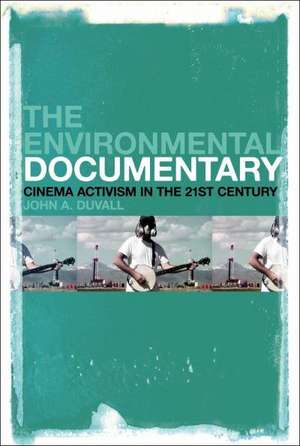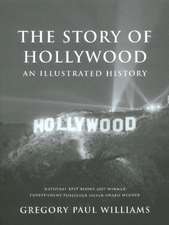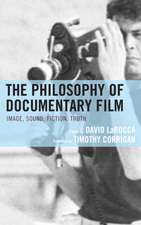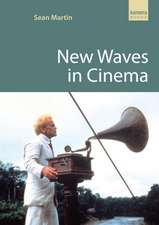The Environmental Documentary: Cinema Activism in the 21st Century
Autor John A. Duvallen Limba Engleză Hardback – 17 mai 2017
| Toate formatele și edițiile | Preț | Express |
|---|---|---|
| Paperback (1) | 240.23 lei 6-8 săpt. | |
| Bloomsbury Publishing – 28 noi 2018 | 240.23 lei 6-8 săpt. | |
| Hardback (1) | 835.93 lei 6-8 săpt. | |
| Bloomsbury Publishing – 17 mai 2017 | 835.93 lei 6-8 săpt. |
Preț: 835.93 lei
Preț vechi: 1199.86 lei
-30% Nou
Puncte Express: 1254
Preț estimativ în valută:
159.95€ • 167.48$ • 132.67£
159.95€ • 167.48$ • 132.67£
Carte tipărită la comandă
Livrare economică 10-24 aprilie
Preluare comenzi: 021 569.72.76
Specificații
ISBN-13: 9781441176110
ISBN-10: 144117611X
Pagini: 368
Ilustrații: 31 bw illus
Dimensiuni: 152 x 229 x 28 mm
Greutate: 0.73 kg
Editura: Bloomsbury Publishing
Colecția Bloomsbury Academic
Locul publicării:New York, United States
ISBN-10: 144117611X
Pagini: 368
Ilustrații: 31 bw illus
Dimensiuni: 152 x 229 x 28 mm
Greutate: 0.73 kg
Editura: Bloomsbury Publishing
Colecția Bloomsbury Academic
Locul publicării:New York, United States
Caracteristici
Provides a recent history, stylistic varieties, and social impacts of the contemporary environmental documentary form
Notă biografică
John A. Duvall is Associate Professor of Communications and Media Studies at Dominican University of California, USA, specializing in Cinema Studies, Production and Writing. He produced the documentary Peak Oil and Transition in conjunction with his doctoral dissertation at the California Institute of Integral Studies. Dr. Duvall formerly edited sound effects in Hollywood and writes feature screenplays.
Cuprins
Introduction1. Documenting the Environment What is a Documentary? What is the Environment?2. Ecocritical Perspectives3. A Brief History of the Environmental Documentary The Films4. General Environmental History and Concerns5. Climate Change6. Peak Oil7. Pollution and Waste8. Food and Water9. Animals and Extinction10. Community and Direct Activism11. Conclusion ReferencesIndex
Recenzii
Over the last two decades, the environmental documentary subgenre has flourished in tandem with the acceleration of concerns over the environment. Duvall (communications and media studies, Dominican Univ. of California) examines documentaries dealing with environmental issues ranging from species extinction to peak oil (i.e., the point at which the US production of fossil fuels will peak and begin to decline). Duvall demonstrates that the value of films such as An Inconvenient Truth (2006) and GasLand (2010) is their ability to educate the public about crises as much as their commitment to activist reportage. That said, the book offers not so much an argument as a survey. The author relies too much on long descriptive passages of films (some of which are widely available, others not so much) at the expense of critical analysis. The most useful sections of the book are at the beginning: Duvall provides a thematic history of environmental documentaries throughout the 20th century, and he uses Bill Nichols's schema for documentary styles to discuss the environmental films in which he is interested. Like the activists he clearly admires, Duvall is dedicated to consciousness raising; his goal seems to be to get readers to see these films and share them with friends and colleagues. Summing Up: Recommended. Lower-and upper-division undergraduates; professionals; general readers.
The Environmental Documentary should be in every college and public library as a handy reference work. It provides helpful material about films we have seen and points us in directions for future viewing.
Useful both for readers interested in documentary filmmaking and those interested in the health of the planet and the environmental movement trying to preserve it. Any library ... should certainly consider adding it.
Duval makes a complex and thoroughly controversial genre accessible in a way that would prompt young scholars and students to seriously consider the destructive impact of consumption and neoliberal ideologies on the environment. Teachers may also find Duval's overview helpful in selecting films for classes dealing with environmental issues ... As such, the book itself functions as a piece of activism, raising awareness not only of our responsibility towards our environment, but also putting a spotlight on a genre that has not received as much attention as it should within the discipline of film studies.
Duvall has given us the first book-length overview of the environmental documentary-a rapidly expanding genre that informs and empowers viewers as the process of ecological decline intensifies due to climate change, resource depletion, population growth, and species extinctions. His work is clear, comprehensive, and authoritative. Recommended for students in environment or media courses, for aspiring filmmakers, and for general readers who want to know more about this important genre.
John A. Duvall's The Environmental Documentary: Cinema Activism in the 21st Century offers a wealth of information on the content, production, and distribution of a selection of recent environmental documentaries ranging from The 11th Hour to Rebels with a Cause. The book also provides readers with succinct overviews of the critical debates around key terms such as "documentary" and "environment.'" It will be useful to students at the high school and college level and to everyone else interested in environmental documentary film.
John Duvall has produced a grand catalogue of environmental documentaries made at the start of the twenty-first century. Contemporary students of documentary and environmental studies can find here a wealth of information on themes, styles, and production conditions. Looking back historians will find in his accounts of the films a significant resource logging the deep concerns of activist communities and their passionate attempts to get them into mainstream debates using all the resources that documentary can offer.
The Environmental Documentary: Cinema Activism in the 21st Century is a well-researched journey through significant films of activist documentary producers and directors. Documentary students brimming with idealistic fervor and eager to intervene should benefit from the extensive real world detail on production narratives and audience reception for major environmental documentaries. I believe this book will be spectacularly useful and inspiring in any documentary curriculum.
With the publication of John Duvall's book, twenty-first century eco-activist documentary boasts its first general primer. Duvall's astute and probing analyses of forty-four key films is buttressed by an admirable historical contextualization of the genre. With its well researched overview of the multiple themes, approaches, and challenges in presenting environmental issues on film, the book makes an indispensable resource, not only for students and scholars of documentary and ecocinema, but for audiences and aspiring filmmakers alike.
Does our environmental movement address effects more than causes? Does it chart feasible alternatives? Duvall's book examines the cream of environmental documentaries to answer these and other crucial questions in this comprehensive, engaging book.
The Environmental Documentary should be in every college and public library as a handy reference work. It provides helpful material about films we have seen and points us in directions for future viewing.
Useful both for readers interested in documentary filmmaking and those interested in the health of the planet and the environmental movement trying to preserve it. Any library ... should certainly consider adding it.
Duval makes a complex and thoroughly controversial genre accessible in a way that would prompt young scholars and students to seriously consider the destructive impact of consumption and neoliberal ideologies on the environment. Teachers may also find Duval's overview helpful in selecting films for classes dealing with environmental issues ... As such, the book itself functions as a piece of activism, raising awareness not only of our responsibility towards our environment, but also putting a spotlight on a genre that has not received as much attention as it should within the discipline of film studies.
Duvall has given us the first book-length overview of the environmental documentary-a rapidly expanding genre that informs and empowers viewers as the process of ecological decline intensifies due to climate change, resource depletion, population growth, and species extinctions. His work is clear, comprehensive, and authoritative. Recommended for students in environment or media courses, for aspiring filmmakers, and for general readers who want to know more about this important genre.
John A. Duvall's The Environmental Documentary: Cinema Activism in the 21st Century offers a wealth of information on the content, production, and distribution of a selection of recent environmental documentaries ranging from The 11th Hour to Rebels with a Cause. The book also provides readers with succinct overviews of the critical debates around key terms such as "documentary" and "environment.'" It will be useful to students at the high school and college level and to everyone else interested in environmental documentary film.
John Duvall has produced a grand catalogue of environmental documentaries made at the start of the twenty-first century. Contemporary students of documentary and environmental studies can find here a wealth of information on themes, styles, and production conditions. Looking back historians will find in his accounts of the films a significant resource logging the deep concerns of activist communities and their passionate attempts to get them into mainstream debates using all the resources that documentary can offer.
The Environmental Documentary: Cinema Activism in the 21st Century is a well-researched journey through significant films of activist documentary producers and directors. Documentary students brimming with idealistic fervor and eager to intervene should benefit from the extensive real world detail on production narratives and audience reception for major environmental documentaries. I believe this book will be spectacularly useful and inspiring in any documentary curriculum.
With the publication of John Duvall's book, twenty-first century eco-activist documentary boasts its first general primer. Duvall's astute and probing analyses of forty-four key films is buttressed by an admirable historical contextualization of the genre. With its well researched overview of the multiple themes, approaches, and challenges in presenting environmental issues on film, the book makes an indispensable resource, not only for students and scholars of documentary and ecocinema, but for audiences and aspiring filmmakers alike.
Does our environmental movement address effects more than causes? Does it chart feasible alternatives? Duvall's book examines the cream of environmental documentaries to answer these and other crucial questions in this comprehensive, engaging book.










